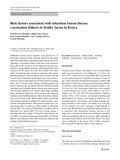Risk factors associated with infectious bursal disease vaccination failures in broiler farms in Kenya

View/
Date
2014-01Author
Muchemi, Gerald
Bebora, Lilly Caroline
Mbuthia, Paul Gichohi
Nyaga, Philip Njeru
Mutinda, Wanzila Usyu
Type
ArticleLanguage
enMetadata
Show full item recordAbstract
Immunization together with application of biosecurity measures are the principal methods of preventing infectious bursal disease outbreaks in high-risk areas. However, outbreaks in vaccinated chicken flocks have been reported in many parts of the world as a result of factors of vaccine virus, animal, or vaccine handler. In Kenya, such outbreaks have been reported, but the causes have not been studied. This study aimed at determining the risk factors associated with vaccine handling leading to vaccine failure in broiler flocks in Kwale County, Kenya. Structured questionnaires and visual observations were used to collect data from 83 broiler farms, 6 breeding farms, and 17 vaccine outlets. Relative risk (RR) analysis was used to determine the association between identified potential risk factors and vaccination failure. Results show that vaccines were properly handled in all vaccine outlet shops. Breeding farms maintained high levels of biosecurity and employed standard vaccine handling practices. Basic biosecurity practices were poor in broiler farms. Broiler farms failed to meet all the recommended standard procedures for vaccine storage, reconstitution, and administration. Risk factors included poor vaccine storage (RR = 8.7) and use of few drinkers to administer vaccine (RR = 5.8); traces of disinfectants in drinkers used to administer live vaccine (RR = 2.8); use of wrong vaccine—infectious bronchitis instead of infectious bursal disease vaccine (RR = 2.1); and use of improper diluents (RR = 1.6). Broiler farmers need training on basic farm biosecurity measures and standard vaccine handling practices.
